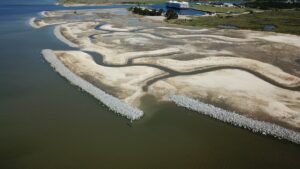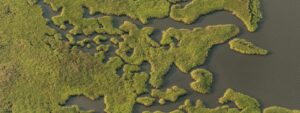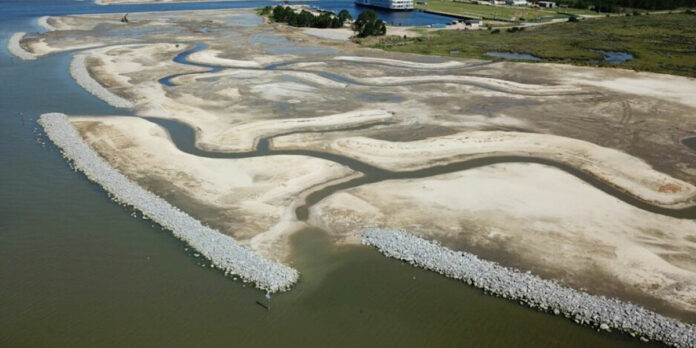The Nature Conservancy (TNC) in Alabama announced earlier last month that it was awarded more than $27 million of $265 million in transformational habitat restoration and coastal resilience funding from the National Oceanic and Atmospheric Administration (NOAA), or about 10 percent of the total award.
The funding will be split between two coastal Alabama projects, with $14.6 million going toward Coffee Island Restoration in Mobile County and more than $12.8 million to the Perdido Watershed Initiative in Baldwin County and the adjoining Escambia County, Florida.
“This is a huge win for Alabama and those who poured their collective hard work into aligning these two projects to meet NOAA’s goals,” TNC in Alabama State Director Mitch Reid in a statement. “We look forward to getting both initiatives off the ground and thank everyone at NOAA for seeing the impact these bring to Alabama’s ecosystem.”
It’s also a huge win for those of us who love to eat those delicious Alabama oysters and shrimp.

(The Nature Conservancy in Alabama/Facebook)
Why the Coffee Island Restoration project is important
The Coffee Island Restoration project will implement a 5,000-ft living shoreline breakwater to help create and enhance habitat, as well as to protect the southeast shoreline of the Mississippi Sound island.
Reid said the project will certainly be good for the habitat of the ultra important mid-island habitat, which is somewhat marsh-like in nature; a critical area for birds and even a fish nursery.
“You have to have those natural habitats that are going to allow our game fish, our shrimp, our oysters, to populate and breed,” Reid said. “Plus, it’s just a phenomenal place for birds, as they come across the Gulf of Mexico during their migrations. That’s the cool part, seeing these puzzle pieces come together.”
The big picture in conservation
The Coffee Island “puzzle piece” is part of a much larger strategy for TNC in Alabama that focuses on protecting some of the most vital coastal communities and areas, so that as they go through unavoidable changes from storms, hurricanes, ship wakes and more, the same communities remain resilient and thriving.
“If you look at Coffee Island as part of our larger strategy, then you extend all the way from the Mississippi line, the protection of Grand Bay and the Grand Bay Coast Forest that is now part of the Forever Wild program, the restoration we’ve done at Lightning Point to protect the town of Bayou La Batre and the shrimping fleet there,” Reid said. “And just move back a little bit to the east and you have Coffee Island, and we’re actually going to build upon a previous restoration project that was done there, which will enhance that project.”
Reid said he is “very proud” of every individual project TNC works on, but the Coffee Island Restoration project will actually complement an already established $20 million investment at Lightning Point, where Bayou la Batre meets the sound, where the shrimp boats (think Forrest Gump waving to Lt. Dan from the Jenny) take off.
“That’s really the context for this project,” Reid said. “It was eroding because of a couple of changes; some dredging activities had changed the topography of the bottom of the sound. You had more ship wakes coming in and we’ve just seen storms become increasingly more impactful.”
Reid further explained what was happening at Lightning Point was that the protection of the city docks where the fishing boats tie up was starting to erode away over time.
“So we went in, using money from the Gulf oil spill for that project, and essentially built out a reef system with a living shoreline component; 350 acres of restored marshland that has demonstrated that… I think there have been five or six named storms that have hit that project, and it’s living up to what we designed to protect that area. That’s allowing the city of Bayou La Batre to invest in their amenities. They’re going to put in a $20 million followup called The City Docks Project.”
That’s just one example of how puzzle pieces fit together for TNC projects, which work to restore those coastal communities and ultimately benefit the entire state and beyond. That, Reid claims, is what is so cool about Alabama.
“Coffee Island, Bayou La Batre and Mobile Bay are coastal communities,” he said. “We don’t have a lot of coast, but that 53 miles is really the point of the spear of this amazing system that is the Mobile Watershed that starts in the mountains of Georgia above Atlanta and over above Tupelo, Miss. All of that sort of comes down out of the mountains, along our coastal plains and to this one place that meets the Gulf of Mexico. Which, in and of itself, is this amazing system.”
In fact, Reid continued, “if you wanted to see where the pinpoint of cool things is in North America, it’s the Mobile Bay Watershed system.”

(The Nature Conservancy in Alabama/Facebook)
Conservation is cool
If we’re talking about cool things in Alabama, conservation tops the list. Not only because it’s important to restore our coastal communities or preserve the natural resources we have, but also because, if we’re being very honest, we love to eat oysters and shrimp. If we don’t take care of and pour into Alabama’s existing natural habitats and fisheries, then that is eventually going to be a lot harder to do.
“I’m thrilled to see Alabama receive this sort of recognition,” Reid said. “It’s a testament to the kind of impact we can have, but also to the resources we have in Alabama that are worth protecting. I’m thrilled that we’re starting to see, both through the federal agencies and the conservation community, how important Alabama is for the larger worldwide picture of conservation. Just the number of people who eat oysters or the number of people who eat shrimp… That in and of itself makes the Coffee Island project worthwhile.”
(Courtesy of SoulGrown, a Yellowhammer Multimedia Subsidiary)
Don’t miss out! Subscribe today to have Alabama’s leading headlines delivered to your inbox.
